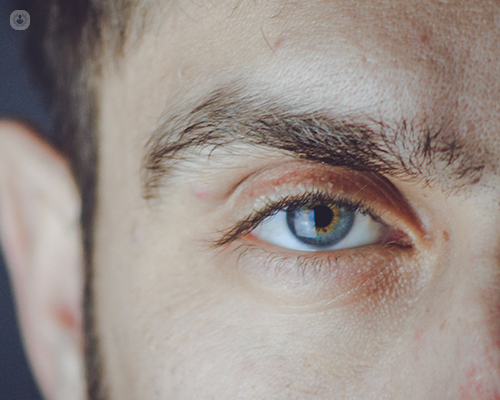How to resolve eye floaters
Escrito por:If you have specks floating around in your vision, you could have eye floaters. These are quite harmless but can be quite limiting if they’re severe enough to obscure your vision. Professor James Bainbridge, a leading London-based consultant ophthalmologist, provides you with the essential facts regarding eye floaters and how they’re treated.

What are eye floaters?
Floaters are mobile shadows in the eyesight which are caused by opacities in the vitreous gel (the gel-like substance that fills the inside of your eyeball). Floaters can take many forms and appear as dots, lines, clouds or veils that drift across the sight.
How common are floaters?
Floaters are very common and can affect the sight of one or both eyes. Many people are familiar with mild floaters that cause minimal impairment of sight - these are not a cause for concern.
When are floaters a cause for concern?
Longstanding mild floaters are typically normal and can be safely ignored. New floaters should prompt specialist care since they can indicate a threat of lasting harm from conditions such as vitreous separation, torn retina, poor circulation and inflammation in the eye.
How can floaters affect eyesight?
Mild floaters typically cause minimal impairment of eyesight, and may only be obvious against a bright plain background such as a page, a screen, or the sky. More severe floaters can cause intermittent or constant impairment of sight.
What is the natural outcome of floaters?
Floaters often improve naturally over a period of weeks and months. This happens if the floaters are absorbed and/or fall out of the line of sight. It can also happen as the brain adapts to ignore them.
What are the treatment options for floaters?
Since most floaters are harmless and not a cause for concern, they can be safely left to improve naturally. Dark glasses can help make floaters less obvious in the meantime. People with floaters that cause persistently disabling impairment of eyesight may benefit from surgery.
What are the likely benefits of surgery for floaters?
Surgery offers the likelihood of a substantial improvement in eyesight in 9 out of 10 people with severe floaters caused by vitreous separation. A small number of floaters may persist.
Can floaters recur after surgery?
Floaters caused by age-related vitreous separation are not expected to recur.
What are the risks of surgery for floaters?
Vitrectomy surgery predictably causes progressive cataract (clouding of the eye’s natural lens) within two years. Cataract typically results in progressive myopia (short sight), glare and clouding of vision, but can be managed by surgery to replace the clouded natural lens with a clear lens implant.
All surgery inside the eye carries a risk of harm from side effects including raised eye pressure, inflammation, detached retina (2 in 100), bleeding and infection (1 in 1000). These effects can usually be managed effectively using medication or further surgery. The risk of lasting harm to sight, comfort or the eye’s appearance despite further treatment is up to 5% (1 in 20).
Most people decide against surgery in view of the risks. For a small minority of people who have persistently disabling impairment of sight, the potential benefits of surgery outweigh the predictable side effects and the risk of lasting harm.
Is any other treatment available for floaters?
Large dense floaters can be broken up inside the eye using a laser (YAG laser vitreolysis). This offers some improvement in 50% of people affected by a large floater. Risks of laser include cataract and injury to the retina.
To learn more and to get in touch with Professor Bainbridge, view Professor Bainbridge’s Top Doctors profile.


